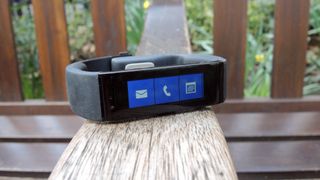Microsoft Band finally brings its fitness superpowers to the UK
Pre-orders open today

Microsoft has made very little fanfare about its first wearable, the Microsoft Band, which is a shame because the device is impressively comprehensive as an activity/health tracker, and it's now coming to the UK.
The device will be available to buy on April 15 for the price of £169.99, with pre-orders opening today. While the Band packs in a number of 'smartwatch' features, including text, email and call notifications, the real focus is put on its fitness capabilities, working alongside Microsoft's Health platform.
The Microsoft Band is laden with a wide range of sensors, allowing it to track , sleep, and of course steps.
The Band is only available in black but you'll be able to change the colour and design of the watch face. It also works with Windows Phone 8.1, iOS 8.1.2 and later and Android 4.3 - 5.0, though you'll have to be paired with a Windows Phone if you want to talk to Cortana on your wrist.
A challenger appears
A recent update introduced a new cycling mode that tracks your biking adventures using the heart rate monitor and GPS.
There's also a quick-read feature that displays messages on the screen one word at a time if you fine the display a bit too small for digesting emails.
Microsoft Health has already partnered with fitness services like RunKeeper, MyFitnessPal and MapMyfitness, but will also have a unique partnership with health and well-being organisation Nuffield Health for the UK launch.
Get daily insight, inspiration and deals in your inbox
Get the hottest deals available in your inbox plus news, reviews, opinion, analysis and more from the TechRadar team.
We've been spending a bit of time playing with it in the UK and have updated our Microsoft Band review to reflect that, but we'll be adding more thoughts to it as we get to spend more time with the wearable.
Hugh Langley is the ex-News Editor of TechRadar. He had written for many magazines and websites including Business Insider, The Telegraph, IGN, Gizmodo, Entrepreneur Magazine, WIRED (UK), TrustedReviews, Business Insider Australia, Business Insider India, Business Insider Singapore, Wareable, The Ambient and more.
Hugh is now a correspondent at Business Insider covering Google and Alphabet, and has the unfortunate distinction of accidentally linking the TechRadar homepage to a rival publication.
Most Popular




